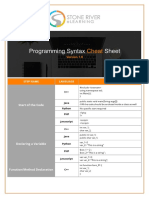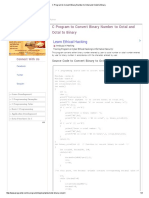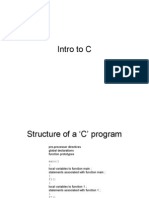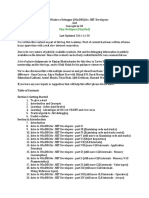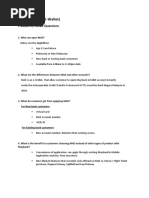0 ratings0% found this document useful (0 votes)
195 viewsC Programming
This document provides a cheatsheet for C programming including:
1) Common string format specifiers and character escapes for printing variables.
2) Arithmetic, relational, logical, and bitwise operators.
3) Control flow structures like if/else, for loops, while loops, do-while loops, and switch statements.
4) Macros, data types, enums, arrays, pointers, and more.
Uploaded by
SherlockCopyright
© © All Rights Reserved
We take content rights seriously. If you suspect this is your content, claim it here.
Available Formats
Download as PDF, TXT or read online on Scribd
0 ratings0% found this document useful (0 votes)
195 viewsC Programming
This document provides a cheatsheet for C programming including:
1) Common string format specifiers and character escapes for printing variables.
2) Arithmetic, relational, logical, and bitwise operators.
3) Control flow structures like if/else, for loops, while loops, do-while loops, and switch statements.
4) Macros, data types, enums, arrays, pointers, and more.
Uploaded by
SherlockCopyright
© © All Rights Reserved
We take content rights seriously. If you suspect this is your content, claim it here.
Available Formats
Download as PDF, TXT or read online on Scribd
You are on page 1/ 4
C Programming Cheatsheet
String Format Specifiers Character Escapes
%[flags][width][.precision][length]specifier • \0 - NULL Constructs
%c char • \b - backspace Do-While Loop
• \f - form feed (new page) i=0;
%hhd||%hhi signed char
• \n - newline do { printf("%d\n", i); ++i;}
%hhu unsigned char • \r - carriage return while(i<10);
• \t - tab For Loop
%hhn signed char*
• \v - vertical tab for (i=0; i<10; ++i) {
%lc wint_t Arithmetic Operators printf("%d\n", i);
%ls wchar_t* + Addition }
While Loop
%s string - Subtraction register int i=0;
%d || %i signed int * Multiplication while (i<10) { ++i; }
If, else if, else
%u unsigned int / Division if (0 == 1) {
%hi short int % Modulus/Remainder register signed int ZERO = 0;
} else if (8 <= 4) {
%hu unsigned short int ++ Increment by 1 const float PIf = 3.14F;
%hn short int* -- Decrement by 1 } else {
static char SYM[3] = "π\0";
%l signed long int ++> Pre-increment and compare }
%ln long int* --> Pre-decrement and compare Macros if
#ifdef __linux__
%ll signed long long int Equality Operators # include "custom_header.h"
%lln long long int* == Equal to # include <system_header.h>
#endif
%llu unsigned long long int != Not equal to
Switch-case
%f || %F float or double (%F is uppercase) < Less than switch (INPUT) {
case 0: break;
%Lf || %Le long double > Greater than default: break;
%e || %E scientific notation (mantissa/exponent) <= Less than or equal to }
Ternary Operator
%g || %G shortest representation of %e||%E >= Greater than or equal to
int out = (input == 7 ? 5 : 3);
%o octal unsigned int Logical Operators Goto
Operand Meaning Example label:
%x lowercase hex unsigned int goto label;
%X uppercase hex unsigned int && And (x && y) Define Datatype
|| Or (x || y) typedef struct { int x, y; } point_t;
%a || %A hexadecimal float-point
typedef union __number {
%ji intmax_t ! Not !(x < y) int i; double d;
} number_t;
%ju uintmax_t
Bitwise Operators Define Enum
%jn intmax_t* enum cardsuit {
& AND
%zi || %zu size_t || ssize_t CLUBS = 0,
| OR DIAMONDS, HEARTS, SPADES
%zn size_t* };
^ Exclusive OR (XOR)
%ti || %tu ptrdiff_t Variable Aliases and Constants
~ Ones Complement (NOT) const double PI = 3.14159;
%tn ptrdiff_t*
<< Left-shift const double *ARCHIMEDES_NUM = &PI;
%p pointer address extern const double PI; // In Header
>> Right-shift char PI_SYM[3] = "π\0"; // Unicode
%n NULL
Assignment Operators char PI_UTF8[] = u8"π\0";
%% literal % char16_t PI_UTF16[] = u"π\0";
Operand Meaning Equivalent char32_t PI_UTF32[] = U"π\0";
Width and Precision
= Assign None Arrays
%.3f float precision of 3 (like 3.141) double num[2] = { 3.14, 5.0 };
+= Add X = X + Y
%4d 4 digit wide int (like 2015) unsigned int LargeArray[2][4] = {
-= Subtract X = X - Y { 0, 1, 2, 3 }, { 4, 5, 6, 7 } };
%2.2f 2 digits wide and 2 precise (19.95) char words[2][] = { "BSD", "AIX" };
*= Multiply X = X * Y
Flags Order of Operations
/= Divide X = X / Y
- Left-justify () [] -> . :: ! ~ - + * & ++ --
%= Modulus X = X % Y
+ Right-justify * / % + -
<<= Left-shift X = X << Y
SPACE Blank space << >> < <= > >=
>>= Right-shift X = X >> Y
# Preceded hex & octal with "0x" || "0" != == & (Bitwise)
&= AND X = X & Y ^ (Bitwise) | (Bitwise)
0 Left-pad with zeros
Integer from variable - printf("%d", num); |= OR X = X | Y && || (Logical) Ternary operator
Save integer to variable - scanf("%d", &num); ^= XOR X = X ^ Y
Save string to variable - scanf("%s", str_var); Assignment Comma Operator
Created by Devyn Collier Johnson <DevynCJohnson@Gmail.com> (2017) More cheatsheets at DCJTech.info
C Programming Cheatsheet
Datatypes int_fast16_t uint_fast16_t Literal Constant Prefixes
NULL void int_fast32_t uint_fast32_t Octal 0
_Bool bool - <stdbool.h> int_fast64_t uint_fast64_t Binary 0b
char16_t - <uchar.h> char32_t - <uchar.h> intptr_t uintptr_t Hexadecimal 0x
char double <stdfix.h> char \u
enum EOF - <stdio.h> _Fract _Accum wchar_t string L
FILE - <stdio.h> fpos_t - <stdio.h> _Sat _Fract _Sat _Accum UTF-8 string u8
float imaxdiv_t - <inttypes.h> <decimal.h> UTF-16 string u
int long _Decimal32 _Decimal64 UTF-32 string U
long double long int _Decimal128 _Complex _Decimal32 Raw literal string R"delimiter(STRING)delimiter"
long long long long int Literal Constant Suffixes Storage Classes
nullptr_t - <stddef.h> ptrdiff_t - <stddef.h>
• auto - Default specifier; Local-scope
unsigned U || u
• extern - Lasts the whole program, block, or
sig_atomic_t - <signal,h> short unsigned long long ULL compilation unit; globally visible
short char short int long L
• register - Stored in stack or CPU-register
during the code block
size_t - <stddef.h> ssize_t - <stddef.h> float F • static - Lasts the whole program, block, or
struct union double D compilation unit; private in program
• typedef - Specifies a new datatype
wctrans_t - <wchar.h> wctype_t - <wctype.h> long double L • _Thread_local - Thread-local-storage; one
wchar_t - <wchar.h> __ibm128 __float80 W || w instance per thread
Type Qualifiers
WEOF - <wchar.h> wint_t - <wchar.h> __float128 Q || q
• const - Value does not change; read-only
signed unsigned __ibm128 W • restrict - For the lifetime of the pointer, the
object can only be accessed via the pointer
signed char unsigned char _Imaginary i
• volatile - Optimizing-compilers must not
signed int unsigned int _Complex128 KC change
• _Atomic - Objects free from data races
signed long unsigned long exponent E
Function Specifiers
signed long int unsigned long int __Decimal32 df || DF • inline - Inline the function when compiling
signed long long unsigned long long __Decimal64 dd || DD • _Noreturn - The function does not return
signed long long int unsigned long long int __Decimal128 dl || DL
Function Attributes (__attribute__(()))
GNU-GCC only
signed short unsigned short short _Fract || _Sat short _Fract HR || hr Use in function declaration (header)
https://gcc.gnu.org/onlinedocs/gcc/Function-
signed short int unsigned short int _Fract || _Sat _Fract R || r
Attributes.html
__float80 __float128 long _Fract || _Sat long _Fract lr || LR https://gcc.gnu.org/onlinedocs/gcc/Common-
<complex.h> long long _Fract || _Sat long long llr || LLR
Function-Attributes.html
_Fract • alias - The function is an alias for another;
complex _Complex Example: void f () __attribute__
unsigned short _Fract || _Sat unsigned uhr || ((weak, alias ("__f")));
float complex float _Complex short _Fract UHR
• aligned - Set alignment
double complex double _Complex unsigned _Fract || _Sat unsigned ur || UR • always_inline - Inline the function
long double complex long double _Complex _Fract • cold - Unlikely to execute; used for
unsigned long _Fract and _Sat ulr || ULR
optimizations
imaginary _Imaginary • constructor - Call function before main()
unsigned long _Fract
float imaginary float _Imaginary • destructor - Call function after main()
unsigned long long _Fract || _Sat ullr || • deprecated - Emit warning msg when called
double imaginary double _Imaginary unsigned long long _Fract ULLR • error - Emit error message when called
long double imaginary long double _Imaginary short _Accum || _Sat short _Accum hk || HK • flatten - Inline all functions in the function;
__attribute__((flatten))
_Complex80 _Complex128 Accum || _Sat _Accum k || K
• hot - Very likely to execute; used for
<stdint.h> long _Accum || _Sat long _Accum lk || LK optimizations
• nonnull - None of the input pointers are NULL
intmax_t uintmax_t long long _Accum || _Sat long long llk || LLK
• nothrow - The function is guaranteed not to
_Accum
int8_t uint8_t throw an exception
unsigned short _Accum || _Sat uhk || • optimize - Set specific optimization options for
int16_t uint16_t unsigned short _Accum UHK the function
int32_t uint32_t unsigned _Accum || _Sat unsigned uk || UK • pure - The function accepts arguments, has
_Accum single return, and has no other effects
int64_t uint64_t
• returns_twice - Returns two separate values
unsigned long _Accum || _Sat ulk || ULK
int_least8_t uint_least8_t • simd - Create multiple functions that can
unsigned long _Accum
process arguments using SIMD instructions
int_least16_t uint_least16_t
unsigned long long _Accum || _Sat ullk || • warning - Emit warning message when called
int_least32_t uint_least32_t unsigned long long _Accum ULLK
https://gcc.gnu.org/onlinedocs/gcc/Fixed-Point.html
int_least64_t uint_least64_t
int_fast8_t uint_fast8_t
Created by Devyn Collier Johnson <DevynCJohnson@Gmail.com> (2017) More cheatsheets at DCJTech.info
C Programming Cheatsheet
Type Attributes complex float-point • <locale.h> - Category macros
GNU-GCC only • HC - Half Complex; 2 byte half-precision complex • <math.h> - Mathematical and trigonometric functions
float-point • <monetary.h> - Monetary unit string formatting
https://gcc.gnu.org/onlinedocs/gcc/Type- • SC - Single Complex; 4 byte single-precision complex • <mqueue.h> - Message queue
Attributes.html float-point • <ndbm.h> - NDBM database operations
• aligned - Set alignment • DC - Double Complex; 8 byte double-precision • <net/if.h> - List local network interfaces
• deprecated - Emit warning msg when called complex float-point • <netdb.h> - Translating protocol and hostnames into
• mode - Set type mode. Example: typedef • XC - Extended Complex; 12 byte extended-precision numeric addresses
_Complex float complex float-point • <netinet/in.h> - Internet protocol and address family
__attribute((mode(TC))) _Complex128; • TC - Tetra Complex; 16 byte tetra-precision complex definitions
float-point • <netinet/tcp.h> - Additional TCP control options
• packed - Members of a struct or union are • QQ - Quarter-Fractional; 1-byte • <nl_types.h> - Localization message catalog
placed to minimize the memory required • HQ - Half-Fractional; 2-byte functions
• unused - Inform the compiler that members of • SQ - Single-Fractional; 4-byte • <poll.h> - Asynchronous file descriptor multiplexing
a struct or union may appear unused; i.e. the • DQ - Double-Fractional; 8-byte • <pthread.h> - API for creating and manipulating
compiler will not issue warnings • TQ - Tetra-Fractional; 16-byte POSIX threads
UQQ - Unsigned Quarter-Fractional; 1-byte <pwd.h> - passwd and user information access and
Variable Attributes •
• UHQ - Unsigned Half-Fractional; 2-byte
•
control
GNU-GCC only
• USQ - Unsigned Single-Fractional; 4-byte • <regex.h> - Regular expression matching
https://gcc.gnu.org/onlinedocs/gcc/Variable- • UDQ - Unsigned Double-Fractional; 8-byte • <sched.h> - Execution scheduling
Attributes.html • UTQ - Unsigned Tetra-Fractional; 16-byte • <search.h> - Search tables
• aligned - Set alignment • HA - Half-Accumulator; 2-byte • <semaphore.h> - POSIX semaphores
• common - Place variable in "common" • SA - Single-Accumulator; 4-byte • <setjmp.h> - Stack environment declarations
storage; the common section of an object-file • DA - Double-Accumulator; 8-byte • <signal.h> - Signals
• deprecated - Emit warning msg when called • TA - Tetra-Accumulator; 16-byte • <spawn.h> - Process spawning
• UHA - Unsigned Half-Accumulator; 2-byte • <stdarg.h> - Handle Variable Argument List
• nocommon - Allocate space for the variable
• USA - Unsigned Single-Accumulator; 4-byte • <stdbool.h> - Boolean type and values
directly • UDA - Unsigned Double-Accumulator; 8-byte • <stddef.h> - Standard Type Definitions
• unused - Inform the compiler that members of • UTA - Unsigned Tetra-Accumulator; 16-byte • <stdint.h> - Integer Types
a struct or union may appear unused, but that is • CC - Condition Code • <stdio.h> - Standard Buffered I/O
fine; i.e. the compiler will not issue warnings • BLK - Block • <stdlib.h> - Standard Library Definitions
• vector_size - Set the variable's size in bytes • VOID - Void • <string.h> - Several String Operations
and then divide it into parts; A size of 4 and a type • P - Address mode • <strings.h> - Case-insensitive string comparisons
of "char" would make the variable contain four • V4SI - Vector; 4 single integers • <stropts.h> - Stream manipulation and ioctl
• V8QI - Vector; 8 single-byte integers • <sys/ipc.h> - Inter-process communication (IPC)
"char" values • BND32 - 32-bit pointer bound • <sys/mman.h> - Memory management, POSIX
Special Macros and Keywords • BND64 - 32-bit pointer bound Shared Memory, and Memory-mapped files
• __asm__ - Inline assembly code https://gcc.gnu.org/onlinedocs/gccint/Machine-Modes.html • <sys/msg.h> - POSIX message queues
• __attribute__ - Function attribute Printing Width-based Integrals • <sys/resource.h> - Resource usage, priorities, and
• __auto_type - Duck typing limiting
Datatype Print Macros • <sys/select.h> - Synchronous I/O multiplexing
• __extension__ - Inform compiler that the • <sys/sem.h> - XSI (SysV style) semaphores
following code is a GCC extension int8_t PRId8 • <sys/shm.h> - XSI (SysV style) Shared Memory
• _Generic - Type-polymorphism mechanism uint8_t PRIu8 • <sys/socket.h> - Main Berkley sockets header
• __GNUC__ - GNU-GCC compiler • <sys/stat.h> - File information
• __label__ - Create a local label by declaring it int16_t PRId16 • <sys/statvfs.h> - Filesystem information
in the beginning of the scope (__label__ label;); • <sys/time.h> - Time and date functions and structures
uint16_t PRIu16 • <sys/times.h> - File access and modification times
then, place the actual label where needed (label:;)
uint64_t PRIu64 • <sys/types.h> - Various data-types
• __restrict__ - There is only one pointer to the
• <sys/uio.h> - Vectored I/O operations
referenced object; Example: int FUNC(char intmax_t PRIdMAX • <sys/un.h> - Unix domain sockets
*__restrict__ DATA) {} • <sys/utsname.h> - Operating system info and uname
https://gcc.gnu.org/onlinedocs/gcc/C-Extensions.html int_least32_t PRIdLEAST32 • <sys/wait.h> - Status of terminated child processes
&&label - Address of label • <syslog.h> - System error logging
u int_fast32_t PRIuFAST32
typeof(*x) y - Declare y with x's type • <tar.h> - Magic numbers for the tar archive format
Machine Modes intptr_t PRIdPTR • <termios.h> - Terminal I/O interfaces
• BI - 1 Bit Replace "PRI" with "SCN" in scanf() • <tgmath.h> - Type-Generic math macros
QI - Quarter Integer; 1 byte • <time.h> - Time macros
•
• HI - Half Integer; 2 bytes
C POSIX Library • <trace.h> - Tracing of runtime behavior
• <aio.h> - Asynchronous I/O • <ulimit.h> - Resource limiting (DEPRECATED; use
• PSI - Partial Single Integer; 4 bytes; not all bits used
• <arpa/inet.h> - Functions for manipulating numeric IP <sys/resource.h>)
• SI - Single Integer; 4 bytes
addresses (part of Berkeley sockets) • <unistd.h> - Various POSIX functions and constants
• PDI - Partial Double Integer; 8 bytes; not all bits used
• <assert.h> - Macros assertions • <utime.h> - Inode access and modification times
• DI - Double Integer; 8 bytes
• <complex.h> - Arithmetic with complex numbers • <utmpx.h> - User accounting database functions
• TI - Tetra Integer; 16 bytes
• <cpio.h> - Magic numbers for the cpio archive format • <wchar.h> - Wide-Character handling
• OI - Octa Integer; 32 bytes
• <dirent.h> - Functions for opening and listing • <wctype.h> - Wide-Character classification and
• QF - Quarter Floating; 1 byte quarter-precision float-
directories mapping utilities
point
• <dlfcn.h> - Dynamic linking • <wordexp.h> - Word-expansion
• HF - Half Floating; 2 byte half-precision float-point
• <errno.h> - Retrieving Error Number
• TQF - Three Quarter Floating; 3 byte three-quarter-
• <fcntl.h> - File opening, locking, and other file
precision float-point
operations
• SF - Single Floating; 4 byte single-precision float-
• <fenv.h> - Floating-Point environment
point
• <float.h> - Floating Types
• DF - Double Floating; 8 byte double-precision float-
• <fmtmsg.h> - Message display structures
point
• <fnmatch.h> - Filename matching
• XF - Extended Floating; 12 byte extended-precision
• <ftw.h> - File tree traversal
float-point
• <glob.h> - Pathname pattern-matching (globbing)
• TF - Tetra Floating; 16 byte tetra-precision float-point
• <grp.h> - User group information and control
• CQI - Complex Quarter Integer; 1 byte
• <iconv.h> - Codeset conversion facility
• CHI - Complex Half Integer; 2 bytes
• <inttypes.h> - Fixed-size integer data-types
• CSI - Complex Single Integer; 4 bytes
• <iso646.h> - Alternative spellings
• CDI - Complex Double Integer; 8 bytes
• <langinfo.h> - Language information constants
• CTI - Complex Tetra Integer; 16 bytes
• <libgen.h> - Pathname manipulation
• COI - Complex Octa Integer; 32 bytes
• <limits.h> - Implementation-defined constants
• QC - Quarter Complex; 1 byte quarter-precision
Created by Devyn Collier Johnson <DevynCJohnson@Gmail.com> (2017) More cheatsheets at DCJTech.info
C Programming Cheatsheet
• > - Autoincrement addressing memory long long int at least 64-bits [-
Trigraphs Digraphs
operand 922337203685
??= # <: [
• r - General register 4775808,
??/ \ :> ] • i - Immediate integer operand (constant) 922337203685
4775807]
??' ^ <% { • n - Immediate integer operand (static constant)
[0,
• I-P - Machine-dependent immediate integers 184467440737
??( [ %> }
• E - Immediate float operand 09551615]
??) ] %: # • F - Immediate double or vector operand
int128_t 128-bits [-
??! | • G, H - Machine-dependent float-operand 170141183460
• s - Non-explicit immediate integer 469231731687
??< {
• g - Register, memory, or immediate integer 303715884105
??> } operand 728,
170141183460
??- ~ • X - Any operand
469231731687
• 0-9 - Specific operand (i.e. r12) 303715884105
Inline Assembly • p - Memory address operand 727]
asm [volatile] (
Inline x86 Assembly Modifiers uint128_t 128-bits [0,
{ dialect0 | dialect1 | dialect2... } • R - Legacy register
: OutputOperands 340282366920
• q - Any register accessible as rl 938463463374
[ : InputOperands [ : Clobbers ] ] • Q - Any register accessible as rh 607431768211
); // Supported x86 dialects - ("att", "intel") • a - The a register 456]
• b - The b register
• c - The c register Floating-Point Datatypes
asm [volatile] goto (
• d - The d register Type Size Exponent Significand
{ dialect0 | dialect1 | dialect2... }
• S - The si register
: InputOperands float 32-bits 8 24
• D - The di register
: Clobbers • A - The a & d registers double 64-bits 11 53
: GotoLabels • f - Any 80387 floating-point (stack) register
long double 80-bits 15 64
); // volatile disables some optimizations • t - Top of 80387 floating-point stack (%st(0))
• u - %st(1) Quadruple 128-bits 15 113
Specify the assembler name for data: int • y - Any MMX register
Octuple 256-bits 19 237
• x - Any SSE register
var_name asm ("asm_name") = 2;
• Yz - First SSE register (%xmm0) decimal32 32-bits 6 25
Specify the assembler name for functions: int • I - Integer constant in the range 0-31, for 32-bit shifts
func(int x, int y) asm ("asm_func"); • J - Integer constant in the range 0-63, for 64-bit shifts decimal64 64-bits 8 55
• K - Signed 8-bit integer constant decimal128 128-bits 12 115
uint32_t Mask = 1234; • L - 0xFF or 0xFFFF, for andsi as a zero-extending NOTE: The number of significand bits is implicit
uint32_t Index; move
• M - 0, 1, 2, or 3 (shifts for the lea instruction) Powers of Two
asm ("bsfl %1, %0;"
: "=r"(Index) • N - Unsigned 8-bit integer constant (for in and out 2^X Value
instructions)
: "r"(Mask) 0 1
• G - Standard 80387 floating point constant
: "cc");
• C - SSE constant zero operand 1 2
Clobber Arguments • e - 32-bit signed integer constant, or a symbolic
2 4
cc - Indicates that the assembler code modifies the reference known to fit that range (for immediate operands
flags register in sign-extending x86-64 instructions) 3 8
memory - Informs the compiler that the assembly • Z - 32-bit unsigned integer constant, or a symbolic
code performs memory reads or writes to items reference known to fit that range (for immediate operands
4 16
other than those listed in the input and output in zero-extending x86-64 instructions) 5 32
operands https://gcc.gnu.org/onlinedocs/gcc/Machine-
Inline Assembly Modifiers Constraints.html 6 64
• = - Write Datatype Limits 7 128
• + - Read & write
char Smallest [-128, 127] 8 256
• & - Early clobber read & write addressable unit [0, 255]
• % - Commutative; Only read-only operands 9 512
can use "%" short int at least 16-bits [-32768,
32767] 10 1024
• # - Ignored as a constraint [0, 65535] 11 2048
• * - Ignored as a register preference
• ? - Slightly disparage constraint int at least 16-bits [-32768, 12 4096
32767]
• ! - Severely disparage constraint [0, 65535] 13 8192
• ^ - Like "?", but only if operand needs reload
• $ - Like "!", but only if operand needs reload long int at least 32-bits [-2147483648, 14 16384
2147483647]
• m - Memory operand 15 32768
[0,
• o - Offsetable memory operand 4294967295] 16 65536
• V - Non-offsetable memory operand
• < - Autodecrement addressing memory
operand
Created by Devyn Collier Johnson <DevynCJohnson@Gmail.com> (2017) More cheatsheets at DCJTech.info
You might also like
- Resource - Python Cheat Sheets - Python Programming With Sequences of Data - Y9No ratings yetResource - Python Cheat Sheets - Python Programming With Sequences of Data - Y98 pages
- CIS 2107 Computer Systems and Low-Level Programming Fall 2011 FinalNo ratings yetCIS 2107 Computer Systems and Low-Level Programming Fall 2011 Final18 pages
- Async Programming in Rust With Async-StdNo ratings yetAsync Programming in Rust With Async-Std40 pages
- Beginning C Programming For Dummies Cheat Sheet100% (1)Beginning C Programming For Dummies Cheat Sheet5 pages
- 50+ Best Free C Programming Tutorials, PDF & Ebooks - FromDev100% (2)50+ Best Free C Programming Tutorials, PDF & Ebooks - FromDev3 pages
- How To Program in C++: Language SummaryNo ratings yetHow To Program in C++: Language Summary52 pages
- Esc - 1991 - Vol2 - Page710 - Ward - Manipulating Hardware With C100% (1)Esc - 1991 - Vol2 - Page710 - Ward - Manipulating Hardware With C6 pages
- C++ in One Day - The Ultimate Beginners Guide To C++ With 7 Awesome ProjectsNo ratings yetC++ in One Day - The Ultimate Beginners Guide To C++ With 7 Awesome Projects112 pages
- C Program To Convert Binary Number To Octal and Octal To BinaryNo ratings yetC Program To Convert Binary Number To Octal and Octal To Binary3 pages
- The Glib/Gtk+ Development Platform: A Getting Started GuideNo ratings yetThe Glib/Gtk+ Development Platform: A Getting Started Guide71 pages
- C++ Cplusplus Cheat Sheet How To ProgramNo ratings yetC++ Cplusplus Cheat Sheet How To Program53 pages
- Arch Linux Handbook A Simple Lightweight Linux Handbook: Read/DownloadNo ratings yetArch Linux Handbook A Simple Lightweight Linux Handbook: Read/Download3 pages
- Brief Introduction To The C Programming Language: Washington100% (1)Brief Introduction To The C Programming Language: Washington51 pages
- C++ Quick Reference / C++ Cheatsheet: PreprocessorNo ratings yetC++ Quick Reference / C++ Cheatsheet: Preprocessor9 pages
- C Programming Cheat Sheet: Basics VariablesNo ratings yetC Programming Cheat Sheet: Basics Variables2 pages
- ARP Mapping: in A Frame With The MAC Address of The Local Host, or Next-Hop RouterNo ratings yetARP Mapping: in A Frame With The MAC Address of The Local Host, or Next-Hop Router17 pages
- (Ebook) Writing a C Compiler: Build a Real Programming Language From Scratch by Nora Sandler ISBN 9781718500433, 1718500432 download100% (2)(Ebook) Writing a C Compiler: Build a Real Programming Language From Scratch by Nora Sandler ISBN 9781718500433, 1718500432 download57 pages
- Win201A-En-I-02.1/2.2: CMD - Exe Vs Powershell - Exe/Command Discovery Using Windows Powershell 4.0No ratings yetWin201A-En-I-02.1/2.2: CMD - Exe Vs Powershell - Exe/Command Discovery Using Windows Powershell 4.06 pages
- Python programming: A Quick and Easy Approach to Learning Python ProgrammingFrom EverandPython programming: A Quick and Easy Approach to Learning Python ProgrammingNo ratings yet
- Mastering PowerShell Scripting: Automate repetitive tasks and simplify complex administrative tasks using PowerShellFrom EverandMastering PowerShell Scripting: Automate repetitive tasks and simplify complex administrative tasks using PowerShellNo ratings yet
- Any Connect VPN Client Sop: Install Mobilepass ApplicationNo ratings yetAny Connect VPN Client Sop: Install Mobilepass Application8 pages
- Challenges and Opportunities of FacebookNo ratings yetChallenges and Opportunities of Facebook12 pages
- Secure Implementation of Content Protection Schemes On Consumer Electronic Devices PDFNo ratings yetSecure Implementation of Content Protection Schemes On Consumer Electronic Devices PDF17 pages
- Get Build Your Own Security Lab A Field Guide for Network Testing Michael Gregg free all chapters100% (7)Get Build Your Own Security Lab A Field Guide for Network Testing Michael Gregg free all chapters61 pages
- 500 Important Questions With Answers Download As PDF: Library and Information Science67% (3)500 Important Questions With Answers Download As PDF: Library and Information Science28 pages
- Relationships Between Time-Management Skills100% (1)Relationships Between Time-Management Skills15 pages






